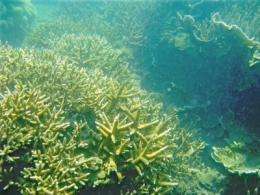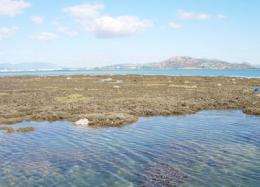Coral reef thriving in sediment-laden waters

Rapid rates of coral reef growth have been identified in sediment-laden marine environments, conditions previously believed to be detrimental to reef growth. A new study has established that Middle Reef – part of Australia's iconic Great Barrier Reef – has grown more rapidly than many other reefs in areas with lower levels of sediment stress.
Led by the University of Exeter, the study by an international team of scientists is published today in the journal Geology.
Middle Reef is located just 4 km off the mainland coast near Townsville, Australia, on the inner Great Barrier Reef shelf. Unlike the clear waters in which most reefs grow, Middle Reef grows in water that is persistently 'muddy'. The sediment comes from waves churning up the muddy sea floor and from seasonal river flood plumes. The Queensland coast has changed significantly since European settlement, with natural vegetation cleared for agricultural use increasing sediment runoff. High levels of sediment result in poor water quality, which is believed to have a detrimental effect on marine biodiversity.
The research team collected cores through the structure of Middle Reef to analyse how it had grown. They used radiocarbon dating to map out the precise growth rate of the reef. Results show that the reef started to grow only about 700 years ago but that it has subsequently grown rapidly towards sea level at rates averaging nearly 1 cm per year. These rates are significantly higher than those measured on most clear water reefs on the Great Barrier Reef and elsewhere. Most intriguingly, the periods of most rapid growth – averaging 1.3 cm a year – occurred when the accumulation rates of land-derived sediment within the reef structure were also at their peak. They discovered that, while the reef faced high sediment levels after the European settlers arrived in the 1800s, these same conditions were also part of the long-term environmental regime under which the reef grew.

Although there is evidence that other reefs have suffered degradation from high levels of sediment, these findings suggest that in some cases reefs can adapt to these conditions and thrive. For Middle Reef, rapid rates of vertical reef growth have, paradoxically, probably been aided by the high sedimentation rates. The team believe this is because the accumulating sediment rapidly covers the coral skeletons after their death, preventing their destruction by fish, urchins and other biological eroders, thus promoting coral framework preservation and rapid reef growth.
Professor Chris Perry of Geography at the University of Exeter said: "Our research challenges the long-held assumption that high sedimentation rates are necessarily bad news in terms of coral reef growth. It is exciting to discover that Middle Reef has in fact thrived in these unpromising conditions. It is, however, important to remain cautious when considering what this means for other reefs. Middle Reef includes corals adapted to deal with high sedimentation and low light conditions. Other reefs where corals and various other reef organisms are less well adapted may not do so well if sediment inputs increased.
"Our research calls for a rethink on some of the classic models of reef growth. At a time when these delicate and unique ecosystems are under threat from climate change and ocean acidification, a view endorsed in a recent consensus statement from many of the World's coral reef scientists, it is more important than ever that we understand how, when and where reefs can grow and thrive."
Journal information: Geology
Provided by University of Exeter














